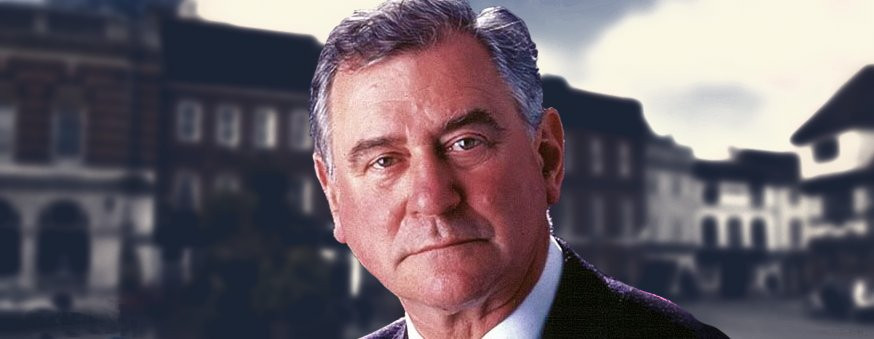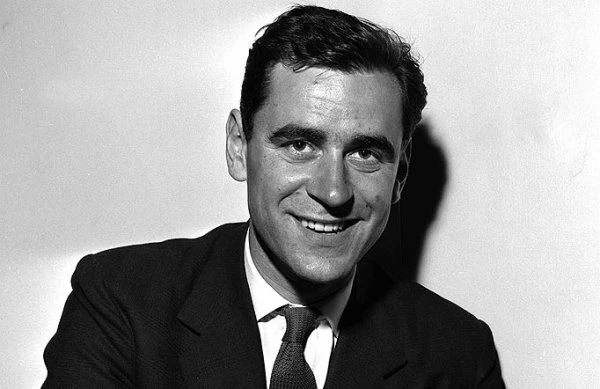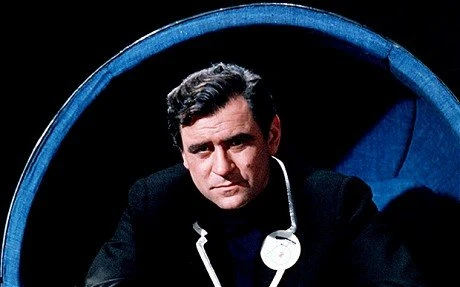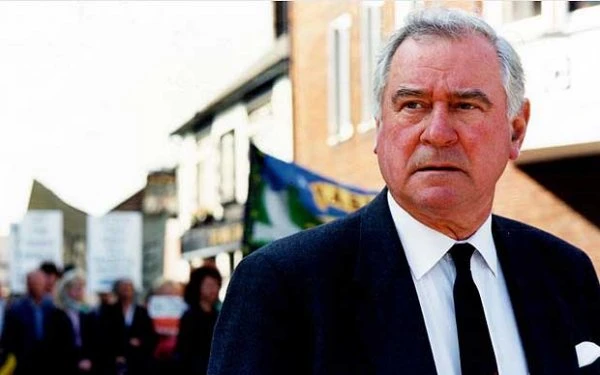
George Baker
George Baker, probably best known for his role as Chief Inspector Reg Wexford in the Ruth Rendell Mysteries, had a varied and colourful life, including myriad roles on stage and both the big and small screens and as a writer. His endeavours to entertain us, in a career spanning six decades, certainly succeeded.
George was born in Varna, Bulgaria on 1 April 1931, where his father, Frank, a British Consul and his mother, Eva, an Irish nurse, helped to set up a Red Cross mission. George had an unconventional but happy childhood and decided at the age of 4 to become an actor! He struggled academically as he battled dyslexia but found plenty of time for indulging in his passion for swimming & riding until his idyllic lifestyle was curtailed by the outbreak of the second World War.
George’s parents decided it would be better for the children if they left Bulgaria, and so in 1940, George and his brothers, Frank, Patrick & Terence along with sister Eve and their mother, made a dramatic journey across war torn Europe & escaped to England, just as France fell to the Nazi invasion. George never saw his father again.
Throughout the war years, George and his siblings led a nomadic life as they moved from place to place and settled at various stages in Ireland, Yorkshire & Sussex, with George playing a major role in the families welfare by cleaning for his family and cooking, a skill which he was to become a dab hand at and which led him to write books on the subject.

George was educated mainly in York, at St. Olave’s and then St. John’s at Green Hammerton just outside York. He then went to Red House, a boy’s preparatory school at Marston Moor, where despite his dyslexia he started to read and developed his love for books & poetry. He ended his schooling in Sussex at Lancing College. In 1946, after the war had ended, George got a job as a junior clerk in a machine tool engineers and whilst there, he auditioned for a production of The Cradle Song and landed the role of narrator. He then got a job for the Poplar Borough Council, where a friend, Dougie Newman, advised him to give his notice & pursue his dream, otherwise he would live to regret it as Dougie himself had done.
George was given an opportunity with the Burke Onwin player’s in Deal, Kent, and during a production of Life With The Carter’s the popular entertainer Sid Field saw him and invited him for a drink after the show. When Field discovered George had no formal training, he wrote 4 letters of introduction for him and when the season finished at Deal, George, armed with the letters Field had given him headed for London to try his luck in the big city.
George obtained an Assistant Stage Manager’s position at The Richmond Theatre and so his career in acting started in earnest until he received his call up papers. In March 1949 he went to Winchester to do his training with the Rifle Brigade. He was selected for the Mons Officer Cadet School in Aldershot, to train for a career in tanks and during this period he met and courted Julia Squires.
George passed out of the Mons Officer Cadet School into the 3rd Royal Tank Regiment which was stationed in Hong Kong. Before leaving for Hong Kong however, George & Julia were married on 22 December 1950. He finished his national service in Pembrokeshire where he was sent from Hong Kong after contracting a tropical disease and was demobbed in March 1952.
George went back to work in the theatre and in the spring of 1953, he landed a part in Aren’t We All? which was to tour the provinces and then end with a West End run at the Theatre Royal, Haymarket. It was a success and George impressed Guy Hamilton enough to be offered a small part in a film he was about to direct The Intruder (1954) which was to star Jack Hawkins. This was quickly followed up that same year with a part in The Dambusters.
Family commitments led to George having to turn down an offer to join the Royal Shakespeare Company and so he became contracted to Associated British Picture Corporation by way of a 7-year contract. He tested for the part of Ishmael in John Houston’s Moby Dick, which ultimately went to Richard Basehart, but George’s test impressed Michael Balcon enough to cast him in the lead, George’s first, in The Ship That Died Of Shame (1955) much to the chagrin of director Basil Dearden who didn’t want him in it.
The following years saw many events in George’s life, including, The lead in The Moonraker (1957) with Sylvia Sims and Marius Goring, the birth of his daughters Candida, Tessa, and twins Charlotte & Eleanor, an affair with Brigitte Bardot, a run on Broadway in Noel Coward’s Look After Lulu, (1958) a tour of Russia & Poland with The Old Vic company (1961) and in 1964 he played Jack Tanner in George Bernard Shaw’s Man and Superman at the Theatre Royal, Windsor.
He then played Rudolf Rassendyll/King Rudolf in a TV production of Rupert of Hentzau the sequel to The Prisoner of Zenda with Peter Wyngarde as Rupert. In the supporting cast was Sally Home, who would, in time, become George’s second wife. In 1966 George formed his own theatrical company, Candida Plays, based at The Theatre Royal, Bury St. Edmunds, and for his first season he put on a repertoire of plays, Coward’s Private Lives, Ibsen’s Ghost’s, and a double bill of Augustus Does His Bit by G.B. Shaw and The Resounding Table by N.F.Simpson. The first night opened with Private Lives and it and the season were a great success, however, during this run, George suffered a heart attack and also had the double whammy of having to inform his wife Julia that Sally Home was expecting his child. On 29 October 1967, Sarah, George’s fifth daughter was born.
After recovering from his heart attack George remained active with Candida Plays and produced 35 plays over the next 5 years until he had to wind up the company in 1971. During all this time, George was still in great demand to appear in Film & TV with a string of appearances to his name in amongst others, Gideon’s Way, Curse of The Fly, The Baron, the first of 3 Bond movies, an unaccredited part as a N.A.S.A. engineer, in You Only Live Twice (1967) with Sean Connery as 007, a part Ian Fleming wanted George for. He also had a role in the first ever episode of a new action adventure series made by I.T.C. called The Prisoner as “the new No 2.”

In 1969 George appeared in the musical film version of Goodbye Mr Chips with Peter O’Toole and Petula Clark, and the second of his trio of Bond appearances as Sir Hilary Bray in On Her Majesty’s Secret Service with George Lazenby as Bond. 1970 saw him in Paul Temple, Doomwatch, Up Pompeii (as James Bondus) & The Goodies. The intervening years saw George in The Fenn Street Gang (1971) as Mr Bowler, which led to his own spin off series Bowler (1973), The Persuaders, Some Mother’s Do ‘Ave ‘Em, The Protector’s & several episodes of Z Cars & Softly, Softly, before his 3rd Bond film, The Spy Who Loved Me (1977) with Roger Moore as Bond.
During this hectic spell, George also got divorced from Julia, and married Sally at Chelsea Registry Office on 11 October 1974. He joined the Royal Shakespeare Company at Stratford in 1975 and played Tiberius in the B.B.C’s highly acclaimed I, Claudius (1976). March 1977 saw George fly off to New Zealand to film 4 adaptations of Ngaio Marsh’s Inspector Alleyn books, Died In The Wool, Colour Scheme, Vintage Murder & 'eath At The Dolphin, with George as Inspector Alleyn.
On returning from New Zealand, George remained busy writing and directing and in 1978 was commissioned to write a play, The Fatal Spring which was about 3 poets who fought in The 1st World War, Siegfried Sassoon, Wilfred Owen & Robert Graves. Charles Dance played Sassoon and on the strength of his performance got his part in The Jewel and The Crown. The Fatal Spring won the U.N. Media Peace Prize Award of Merit and was one of George’s proudest achievements.
Meanwhile, TV work was pouring in and George enhanced many shows including Doctor Who, for which he also submitted a script, The Gentle Touch, The Chinese Detective, A Woman of Substance, Hart to Hart and 2 series of Triangle, a soap about a cross channel ferry. He appeared in another version of Goodbye Mr Chips with Roy Marsden as “Chips” and he played Richard of Leaford, Maid Marion’s father in several episodes of Robin of Sherwood and in 1987 made a fateful appearance in an Agatha Christie mystery, At Bertram’s Hotel with Joan Hickson as Jane Marple.
“I was playing in Bertram’s Hotel in the Miss Marple TV series. The director, Mary McMurray was editing it at Elstree when the Ruth Rendell director John Davies stepped into the studio and said, ‘Who is that?’ He called up my agent and offered me the job. It was extraordinary. At that moment, she happened to have my scene on screen, he happened to be passing and my director happened to have asked me to play the part in a country accent”. — George Baker
Thus arrived a script from Southern Television on George’s desk, Wolf To The Slaughter which was to be a one off piece but with the possible option for a further 3 stories to be made if successful, and George was to play a West Country copper, Chief Inspector Reg Wexford.

On Wednesday 20 October 2000, 13 years after Wolf To The Slaughter, the 23rd & last Inspector Wexford story, Last Harm Done, was transmitted. During this time George had written the screenplay for 3 of the Ruth Rendell Wexford novels, “From Doon With Death”, “The Mouse In The Corner” & “Road Rage”, he also adapted another Rendell novel for TV, “The Strawberry Tree” which starred Lisa Harrow & Simon Ward.
In 1992, George’s second wife Sally, succumbed to cancer after a brave 2 year fight against the disease, however, George was eventually to rediscover happiness and 18 months after Sally died he married Louie Ramsay, on 25 September 1993, his screen wife Dora in the Wexford stories, in a registry office ceremony followed by a church blessing in All Saint’s Church, West Lavington, Devizes, Wiltshire. Amongst the guests were Ruth Rendell & Charles Dance as well as the cast & crew of Wexford. The catering was provided by the “Wexford” caterers.
In 1994, George played The Earl of Dorrincourt in the BBC’s Little Lord Fauntleroy, which was scripted by Julian Fellowes, and which George considered to be the best work he’s ever done.
More Wexfords followed and in 1999 George, happily, won his own battle with cancer.
At the turn of the century George continued his production line by making Back to the Secret Garden (2001) with Joan Plowright, and an episode of the Vic Reeves/BobMortimer version of Randall & Hopkirk (Deceased). 2003 saw George thoroughly enjoying himself as brewery owner Cecil Newton, courting Bet Lynch in Coronation Street and in 2005 he played twins Charlie & Jack Magwood in Midsommer Murders. He also made an appearance in the BBC series Spooks.
George was awarded an MBE in 2007 for his fundraising activities for his local youth club in West Lavington. That same year he made his last two television appearances in Heartbeat and New Tricks.
George Baker passed away on 7 October 2011, just a few months after his wife. He was 80 years old.
George Baker's Film and TV credits can be found at https://www.imdb.com/name/nm0048468/
Published on November 26th, 2019. Written by Phil McCormack for Television Heaven.









